Knowde Enhanced TDS
Identification & Functionality
- Active Component
- Ingredient Name
- Protein Type
- Pharma & Nutraceuticals Functions
- Ingredients
- Hyaluronic Acid, Chondroitin Sulfate, Hydrolyzed Chicken Cartilage Extract
Features & Benefits
- Benefit Claims (Health)
- Food Ingredients Features
- BioCell Collagen® Ingredient for Dietary Supplements
BioCell Collagen® is a clinically studied dietary ingredient composed of naturally occurring hydrolyzed collagen type II peptides, chondroitin sulfate, hyaluronic acid. BioCell's unique matrix is not a blend of individual ingredients. Numerous safety, efficacy, and bioavailability research studies, including seven human clinical trials, confirm BioCell Collagen® promotes active joints, youthful-looking skin, and healthy connective tissues. * BioCell Collagen is made in the USA and Germany.
BioCell Collagen® is composed of naturally-occurring hydrolyzed collagen type II peptides, chondroitin sulfate (CS) and hyaluronic acid (HA). BioCell's advanced matrix is not a blend of individual ingredients. Collagen, CS, and HA are essential structural components in the skin dermis and responsible for the skin's moisture, suppleness, elasticity, and beauty. These molecules degrade as we age, contributing to disarray or collapse of the dermal matrix structure, resulting in dermal dehydration and eventually aged skin appearances such as fine lines, wrinkles, and superficial sagging.
SKIN HEALTH
BioCell Collagen® Clinical Dosage: 1 g daily:
- Reduces facial lines and wrinkles
- Reduces crow‘s feet
- Improves skin elasticity
- Reduces skin dryness
- Boosts skin collagen & hyaluronic acid
JOINT HEALTH
BioCell Collagen® Clinical Dosage: 2 g daily:
- Promotes joint comfort and mobility
- Promotes cartilage health and stimulation
- Promotes synovial fluid health
- Boosts hyaluronic acid
Applications & Uses
- Applications
- Dosage Form
- Food & Nutrition Applications
- Applications
Dietary Supplements
- Capsules
- Softgels
- Tablets
BioCell Technology LLC owns intellectual property rights to BioCell Collagen® and is only available to partner companies via a License Agreement. Licensing of BioCell Collagen® is not available for oral liquid or powdered drink mix applications or any products marketed through direct selling (as defined by dsa.org) or multi-level marketing (MLM) sales channel.
- Cosmetic Applications
- Anti-Aging Cosmetic Products
- Moisturizing Cosmetic Products
Regulatory & Compliance
- Certifications & Compliance
Technical Details & Test Data
- White Paper Research Information
Unique Molecular Nature:
- There are at least 28 different types of collagens found in the body.
- Much diversity exists between ingredients in the collagen space that can impact effectiveness depending on many factors, including type, source, molecular composition, molecular weight, and manufacturing process.
- BioCell Collagen® is much more than an isolated or purified collagen protein.
- BioCell Collagen® is a unique synergistic ingredient composed of naturally occurring hydrolyzed collagen type II peptides, chondroitin sulfate, and hyaluronic acid.
- BioCell Collagen® is not a blend of isolated collagen, chondroitin, and hyaluronic acid.
- The utility of the complex matrix of molecules has been clinically established.
- One cannot expect the same results from using isolated molecules or ingredient blends.
- BioCell Collagen® is derived exclusively from hormone and antibiotic-free chicken sternal cartilage, a rich source of type II collagen, hyaluronic acid, and chondroitin sulfate, which closely mirrors the composition of human articular cartilage.
- Chicken cartilage is a clean and desirable source because it is free from the blood supply and devoid of lymphatics and nerves, unlike other parts of the carcasses of fish, cows, pigs, or chicken used to manufacture most collagen ingredients on the market, including gelatin.
- Gelatin products may also be referred to as hydrolyzed collagen, collagen hydrolysate, gelatine hydrolysate, hydrolyzed gelatine, collagen type l, collagen type I & III, multi-collagen, and collagen peptides after it has undergone hydrolysis to enhance bioavailability.
- These products, including bone broth powders, typically contain high protein content (>90%) and are predominantly Type I collagen since it is the most abundant collagen in the body.
- The effective daily amounts of collagen peptides typically range from 2.5 to 15-gram.
- On the other hand, Type Il collagen is valuable due to the scarcity of its source and unique molecular composition.
- Type II collagen comes from cartilage, making up most of the protein content, and coexists with GAGs CS and HA.
- BioCell Collagen® has a clinically established daily use of 1 to 2-gram.
Evidence based scientific research:
- Clinical studies suggest that ingestion of BioCell Collagen® stimulates production of fibroblasts which have a pivotal role in skin renewal and of chondrocytes which play a key role in the renewal mechanism of cartilage, thus supporting all three major collagen types (I, II, and III).
- Moreover, BioCell Collagen® demonstrated concentration-dependent inhibition of hyaluronidase, the enzyme that degrades hyaluronic acid, contributing to signs of aging on the skin and loss of viscoelasticity of joint synovial fluid.
- BioCell Collagen® also attenuates deleterious changes in biomarkers including creatine kinase, lactate dehydrogenase, and C-reactive protein, adding further clues into its mechanism of action.
- In a published randomized, double-blind, placebo-controlled clinical trial, 500 mg of BioCell Collagen, taken twice daily, was found to help reduce the signs of skin aging.
- This study evaluated the use of BioCell Collagen® among 128 women aged 39-59. A measurable improvement in signs of aging in women, represented by the appearance of increased skin elasticity, and improvement in depth and number of fine lines and wrinkles was seen in these women within 12 weeks of daily use of 1-gram of BioCell Collagen®.
- These results corroborated the results of an earlier study that found ingestion of BioCell Collagen® enhanced blood microcirculation and reduced facial aging signs.
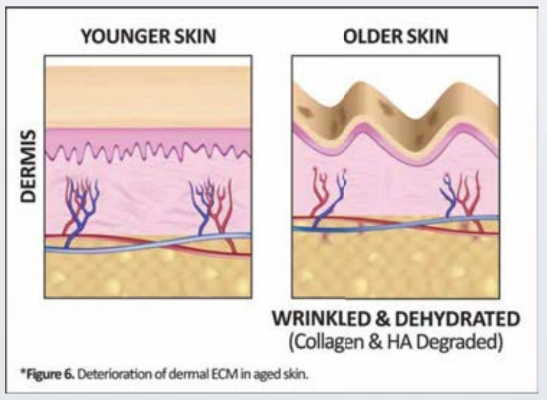
Manufacturing Process:
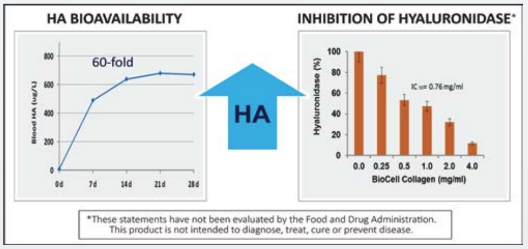
- The manufacturing process of BioCell Collagen uses strict procedures that subject the chicken sternal cartilage through various processes, including filtration, purification, concentration, hydrolysis, sterilization, and testing to ensure consistent quality before distribution.
- BioCell Collagen is non-GMO and free of gluten, soy, shellfish, fish, egg, milk, peanuts, and sugar.
Bioavailability-Low Molecular weight:
- The native forms of collagen and GAGs are too large to be absorbed by our bodies.
- However, BioCell's innovative BioOptimized™ hydrolysis manufacturing process reduces them into very low molecular weight forms to ensure fast and effective absorption into the small intestine.
- A bioavailability study in human subjects showed that ingestion of BioCell Collagen (1500 mg/ day) elevated blood HA levels by sixty times at steady state when compared to the baseline levels.
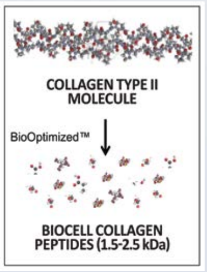
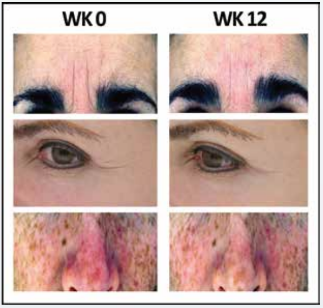
- In another randomized, double-blind, placebo-controlled human clinical trial, 80 subjects, who suffered joint pain from Osteoarthritis, were divided into 2 groups.
- One group ingested two grams of BioCell Collagen®, while the other ingested a placebo, daily for ten weeks.
- The subjects ingesting BioCell Collagen experienced statistically significant improvement in their joint pain and ability to engage in physical activities on days 35 and 70.
- These results corroborated the results of another earlier double-blind placebo-controlled trial tested on sixteen people.
- In a pilot randomized, double-blind placebo-controlled study of BioCell Collagen® on healthy recreationally active subjects, participants ingested three grams of BioCell Collagen® daily over six weeks before an upper-body muscle damaging resistance exercise challenge.
- Participants experienced favorable improvements in stress resilience and recovery after bouts of intense resistance exercise without any reported side effects.
- This preliminary data suggests that BioCell Collagen (3-gram/day) promotes workout recovery.
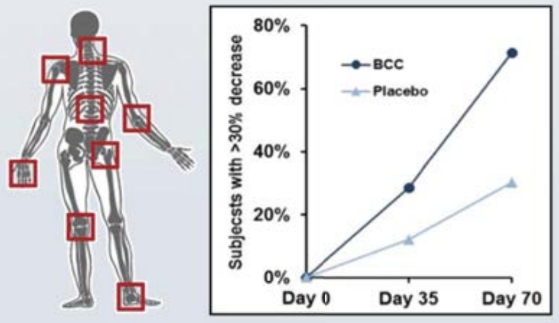
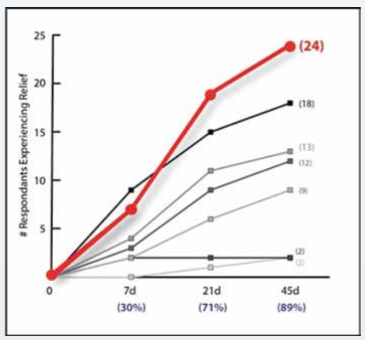
- A published laboratory study found that daily ingestion of BioCell Collagen® reduced common signs of UVB-induced photoaging compared to the group that did not receive the supplement.
- The study found that oral supplementation with BioCell Collagen®, with controlled UVB exposure, resulted in reduced signs of photoaging, including significant decreases in wrinkles and transepidermal water loss, and significant increases in skin elasticity and hyaluronic acid (HA) content.